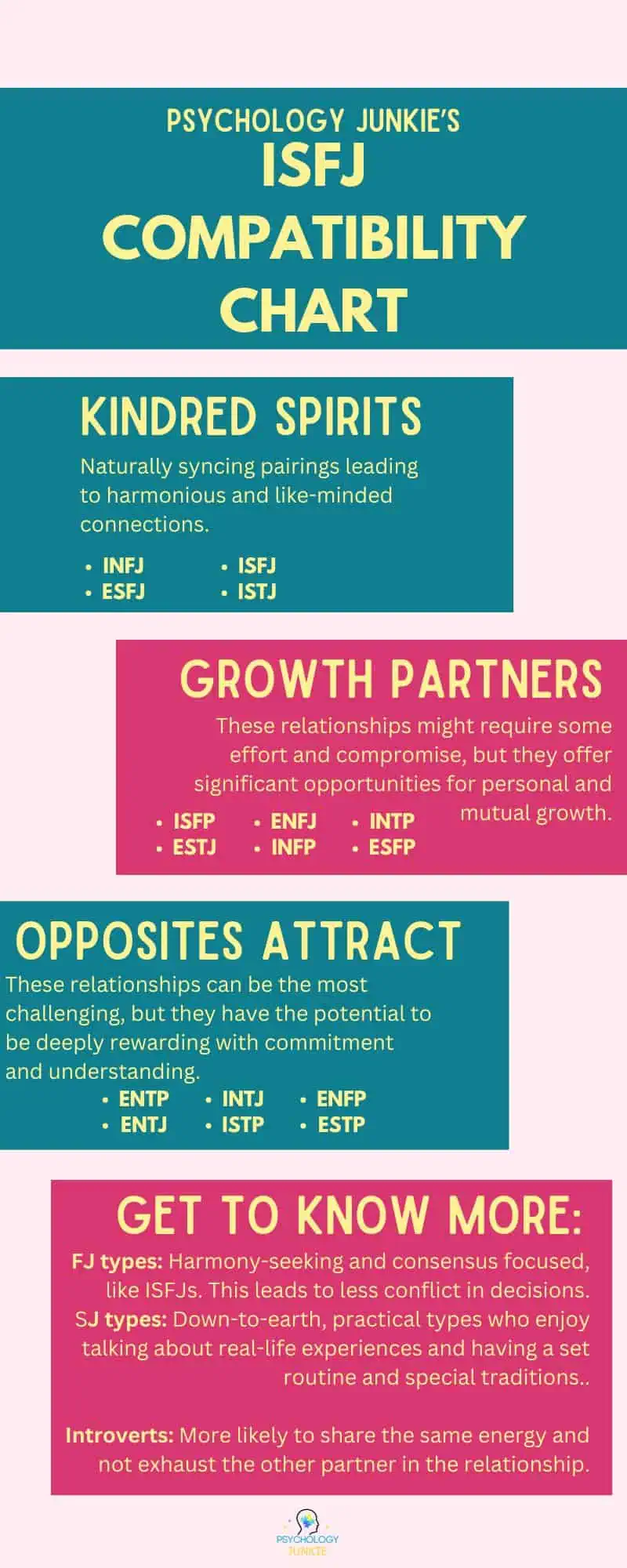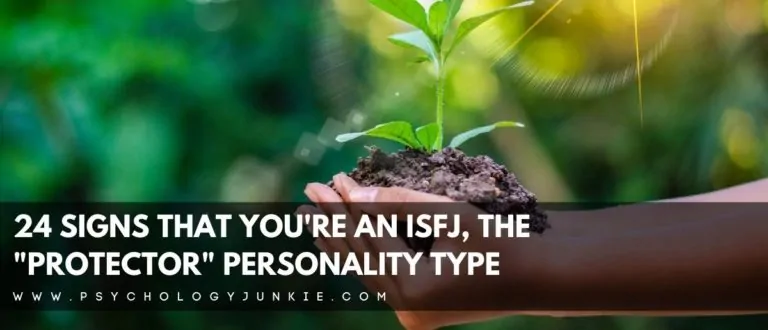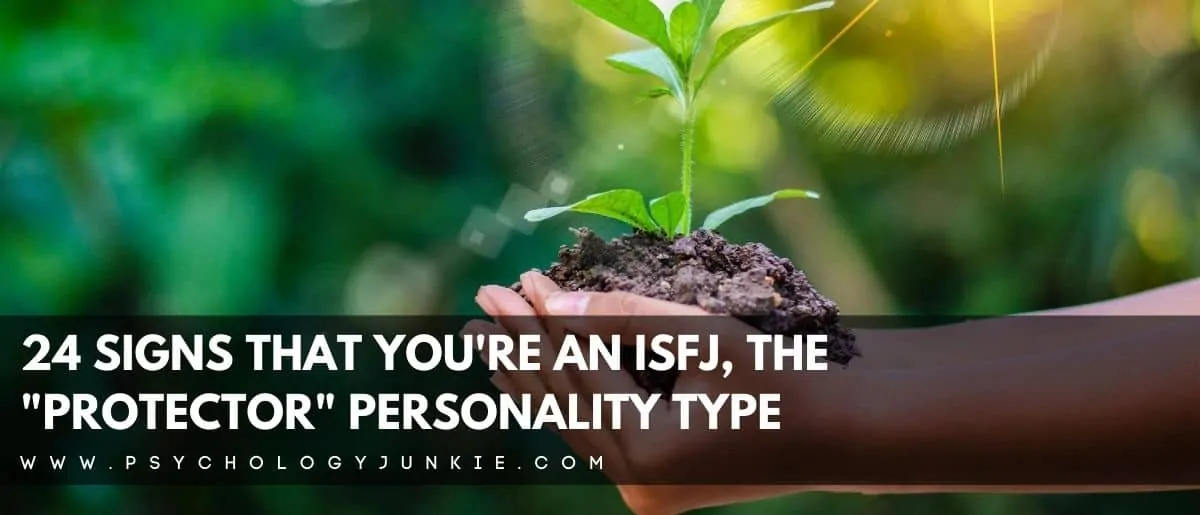ISFJs and Their Compatibility with Every Myers-Briggs® Personality Type
How compatible are ISFJs with every other personality in the Myers-Briggs® system? Let’s take a look!
Not sure what your personality type is? Take our new personality questionnaire here. Or you can take the official MBTI® here.

ISFJs and Their Compatibility with Every Myers-Briggs® Personality Type
Table of contents
- ISFJs and Their Compatibility with Every Myers-Briggs® Personality Type
- ISFJs and ENFPs
- ISFJs and ENTPs
- ISFJs and INFPs
- ISFJs and INTPs
- ISFJs and ENFJs
- ISFJs and ENTJs
- ISFJs and INFJs
- ISFJs and INTJs
- ISFJs and ESFPs
- ISFJs and ESTPs
- ISFJs and ISFPs
- ISFJs and ISTPs
- ISFJs and ESFJs
- ISFJs and ESTJs
- ISFJs and ISFJs
- ISFJs and ISTJs
- What Are Your Thoughts?
Estimated reading time: 1 minute

ISFJs and ENFPs
Both of these types see something in the other that compels and attracts them. To the ISFJ, the ENFP gives them the freedom to explore their more unusual ideas and theories. They get a sense of possibility and excitement from the ENFP that can be compelling and deeply attractive. To the ENFP, there’s a sense of stability, loyalty, and realism from the ISFJ. They get a sense that the ISFJ might be their key to attaining the stable life they’ve put off for so long. Both types give the other partner something that they lack, and this alone can be attractive.
ISFJs and ENFPs can balance each other when they work to strengthen each other’s weaknesses. ISFJs can help ENFPs to prioritize their physical needs and create consistent routines. ENFPs can help ISFJs to pursue their dreams and explore their more quirky, imaginative side. Both types are warm and empathetic, supporting each other emotionally.
The Dark Side: The same things that draws them to each other can also incite problems over time. ENFPs can tire of the security-seeking nature of ISFJs, feeling like they put a damper on their ideas and ventures. ISFJs can tire of the scattered, possibility-seeking nature of ENFPs, feeling like they are too unfocused and out of touch with reality. Both partners need to work hard at not stifling the other’s natural needs. They also need to strive not to be condescending with each other.
ISFJs and ENTPs
Challenge and growth abound in this dynamic relationship. ISFJs and ENTPs have completely opposite preferences, but they both share the same cognitive functions. Because of this, they have the opportunity to help each other grow in ways that many other pairings won’t.
In the ENTP, the ISFJ sees someone who is daring, imaginative, creative, and analytical. In the ISFJ, the ENTP sees someone who is grounded, empathetic, detail-oriented, and thoughtful. Both types can help each other to grow stronger in areas where they are weak, but they have to watch out for condescension.
The Dark Side: Condescension is often the biggest problem in this relationship. Why? Because each type naturally tends to be dismissive of their inferior function. For ISFJs, the inferior function is Extraverted Intuition (Ne), which just so happens to be the ENTP’s dominant function. For ENTPs, the inferior function is Introverted Sensation (Si), which, of course, is the ISFJ’s dominant function. This means that the strength of one partner is often de-valued by the other, and vice versa. Both partners need to be very conscious of how they speak to each other so that they aren’t unconsciously making light of the other person’s perspectives. Both types need to pause before giving criticism to consider the value of what the other person is saying. If they can do this, then there’s a lot of potential for growth in this relationship.
ISFJs and INFPs
Romantic and comforting, this is one of the more successful relationship pairings I’ve seen. ISFJs help INFPs to take care of themselves and find some stability in a world that seems chaotic. They give security, open emotional support, and a grounded sense of home. INFPs help ISFJs to trust their intuition and see the big picture. Together, they can be an unbreakable couple – undying in their loyalty, affection, and support for each other.
The Dark Side: Sadly, this relationship isn’t completely conflict-free. ISFJs and INFPs have different decision-making functions. INFPs prioritize their personal values, looking inward for a sense of what’s right and wrong. ISFJs, on the other hand, prioritize group values and emotional openness. ISFJs want to make a decision that will get everyone’s needs met and provide a sense of consensus. INFPs want to make a decision that will line up with their values, ethics, and desires. It’s less important to the INFP that everyone is happy with the decision (even if they’d like that) then knowing they’ve followed their heart. Together, they can wind up arguing over which outcome is the best. INFPs might think that ISFJs are too focused on “people-pleasing,” and ISFJs might think that INFPs are being selfish.
Understanding that this can be a problem can help to de-escalate conflicts in some ways. When both types reach an impasse, they should slow down and look at the pros and cons of each person’s perspective, without automatically assuming their own perspective is the morally righteous one. Many times, a blend of both their perspectives can be the best choice.
ISFJs and INTPs
There’s a mutual sense of attraction and curiosity that draws these types to each other. They share all of the same cognitive functions but in a completely different order. INTPs enjoy the grounded, down-to-earth nature of the ISFJ. ISFJs enjoy the quirky, imaginative nature of the INTP. Together, they find a comfort zone and a reprieve from the world outside. INTPs love the warmth and gentleness of ISFJs, and ISFJs love the curious, analytical side of the INTP. They both respect each other’s personal space and enjoy talking about a multitude of random subjects.
The Dark Side: The same things that drew these two individuals to each other in the first place can also be frustrations as the relationship progresses. ISFJs like having a plan and feel anxious when there isn’t a sense of order and structure to their lives. INTPs like being flexible, and feel anxious when life is too planned out or structured. They might irritate each other by subconsciously seeking the very thing that drives their partner crazy. It’s important for ISFJs to have a certain amount of control over their schedule, while simultaneously INTPs need unstructured free time to explore their interests. If they can find a balance between these two needs then the relationship will be much more comfortable for both of them.
ISFJs and ENFJs
Affection, warmth, and mutual respect are hallmarks of this romantic pairing. ISFJs and ENFJs both prize emotional transparency and empathy, and both will go to great lengths to support each other. This relationship duo is usually very solid since both types take their commitments seriously and will do almost anything to emotionally be there for each other.
The Dark Side: ISFJs and ENFJs have different ways of seeing the world around them. ENFJs focus on abstract connections and theories. ISFJs focus on their experiences and the tangible world around them. While ENFJs are drawn to conversation about philosophies, concepts, and abstractions, ISFJs are drawn to conversations that have a more immediate practical application. They might find themselves perplexed by each other’s ideas and thoughts simply because they come from a perspective that the other hasn’t really considered. At times they might bore each other because while the ENFJ wants to talk about concepts, the ISFJ wants to talk about details and experiences.
Even though there can be some misunderstandings here, there’s also a potential for growth. ISFJs can help ENFJs to prioritize their physical needs and the details that they tend to lose track of. ENFJs can help ISFJs to see potential and possibility that they might have missed otherwise.
ISFJs and ENTJs
If you’re feeling up for a challenge, then this relationship might be the ideal one for you! These two types are extremely different, which means that they have great potential to help each other grow. In the ENTJ, the ISFJ sees someone who is commanding, decisive, visionary, and competitive. In the ISFJ, the ENTJ sees someone who is detail-oriented, responsible, down-to-earth, and empathic. Because these two types are so different they might not immediately be interested in each other. Their differences might spark more arguments than make-out sessions. However, over time, as both partners learn to appreciate the other’s strengths, a strong bond can form. Both of these types appreciate how dedicated the other partner is, and both will do whatever they can to protect and support each other.
The Dark Side: ENTJs need to be careful not to steamroll over the ISFJ’s sensitivity, and that can be a challenge for them. ENTJs are naturally blunt and can feel like being overly cautious is insulting. They tend to get annoyed with people who beat around the bush or sugarcoat things, seeing it as a pointless waste of time. ISFJs need to be careful not to minimize the plausibility of the ENTJ’s ideas and plans. ENTJs tend to be risk-takers, whereas ISFJs tend to be risk-averse. It may seem like both partners are intentionally trying to get in each other’s way, when in actuality, they are trying to help each other.
ISFJs and INFJs
Warmth and dedication abound in this relationship of kindred spirits. ISFJs and INFJs both know how to make each other laugh, smile, and feel loved. Both prioritize emotional transparency and an organized approach to life. However, where ISFJs prioritize getting the details of life taken care of, INFJs prioritize getting a clear vision of the future. Both types create a sense of balance in the relationship. ISFJs are the grounded, practically-minded partners who enjoy creating stability and a sense of harmonious comfort at home. INFJs are mesmerized by ideas, visions, and theories – trying to clarify a long-term direction for the future. Both partners see the other as enigmatic and slightly confusing. While the INFJ is trying to solve world hunger, the ISFJ is wondering what in the world they’re going to eat for dinner. While the ISFJ is organizing the living room furniture, the INFJ is wondering why the position of the furniture matters in the grand scheme of things.
The Dark Side: Because they prioritize different things, it’s important that they look out for condescension. The ISFJ naturally thinks that their down-to-earth, detail-oriented nature is the best way to be. The INFJ naturally sees their abstract, visionary outlook as the best way. They both can shrug off the concerns of the other, seeing them as somewhat mundane. Yet because they value empathy so much, they’ll try their best not to express their condescension. Over time, these feelings can build and create a gap in the relationship. It’s important for these types to value the information-gathering functions of each other. INFJs need to learn about (and affirm) Introverted Sensing views. ISFJs need to learn to appreciate Introverted Intuition.
ISFJs and INTJs
If a sense of mystery sounds enticing to you, then you should definitely pursue this relationship! ISFJs see the focus, vision, and intellectual prowess of the INTJ as incredibly attractive. The INTJ sees in the ISFJ a grounded, pragmatic individual with a warm, loyal heart. Both appreciate each other’s loyalty and the methodical way they both choose to get things done. They both are introverts so they will respect each other’s need for independence and alone time.
The Dark Side: There is a lot of potential for misunderstanding here. ISFJs often experience INTJs as harsh, guarded, and confusing. INTJs tend to be very private, mulling over their feelings in private rather than expressing them openly. They have little patience for sugarcoating and can be very direct and unaffected when they have criticism to offer. INTJs may experience ISFJs as overly-sensitive, risk-averse, and overly focused on details.
Because INTJs prioritize Intuition, they may see the Sensing-related concerns of ISFJs as trivial. ISFJs enjoy talking about the real world around them in detail. This could mean discussing what color to paint the living room, how to organize the garage, or the details of their friend’s relationships. The INTJ, being more interested in concepts and big-picture goals, may find all this mundane. In turn, the ISFJ might find the INTJ’s theories and strategies boring to listen to in detail. There may be a lot of misunderstandings and unintended offenses in this relationship as a result.
ISFJs and ESFPs
Spontaneity and stability make a truce in this dynamic relationship. The ESFP sees in the ISFJ someone that they can create a sense of home with. In the ISFJ, they see someone warm, reliable, and steady. This is someone who values hard-work, reliability, and empathy. In ESFPs, ISFJs see someone who can break them out of their shell and introduce them to new experiences and excitement. The spontaneity, charm, and exuberance of the ESFP can be enticing to the ISFJ. The devotion, loyalty, and focus of the ISFJ can be attractive to the ESFP. Together, they can help each other to find balance and joy.
The Dark Side: Both personality types need to be careful about each other’s stressors. ISFJs find sudden changes in plans stressful, and they crave a consistent routine. ESFPs, in contrast, like being flexible and ready for any unexpected change. While ESFPs thrive with a little bit of chaos, ISFJs find it nerve-racking. And while ISFJs thrive with a consistent routine, ESFPs find it stifling. ISFJs weigh the group’s needs when making a decision, while ESFPs focus on their individual values (sometimes this will reflect group values, sometimes not). Learning about each other’s personality types and love languages can help this type to bridge the gaps created between these differences.
ISFJs and ESTPs
Dynamite sparks ignite between these two personality types. ISFJs find in the ESTP a certain sexy, devil-may-care charm that is unforgettable. ESTPs, in turn, are able to bring out the inner quirkiness, humor, and sense of fun that ISFJs bring to the table. ESTPs bring out a more adventurous, offbeat side of the ISFJ and ISFJs bring out the warmth and protective nature of the ESTP.
The Dark Side: No relationship is completely problem-free. These types both have to look out for each other’s stressors and keep communication open in order to avoid serious trouble. ESTPs like a lot of spontaneity, freedom, and flexibility. ISFJs like a lot of stability, structure, and routine. Both can stifle the other if they insist on their way being the only way. The introverted partner will need planned-out alone time to recharge, and the extrovert will need daily unstructured time to pursue their interests. ESTPs need to (as much as possible) let ISFJs know what to expect, and ISFJs need to allow ESTPs as much flexibility as possible. If these two types can work to understand each other and meet each other’s needs, they can both grow and become better versions of themselves.
ISFJs and ISFPs
Quiet and comforting, this relationship is usually built upon mutual respect and support. ISFJs and ISFPs are both quiet, deeply feeling types who invest a lot of time and attentiveness into their relationships. Both are introverts, so they will both understand and respect each other’s need for alone time. And both are feeling types, so they will be guided by their values and a desire to be conscientious with each other.
The Dark Side: Because these types share none of the same cognitive functions, they can feel similar at first glance, only to wind up misunderstanding each other as the relationship progresses. ISFJs crave a steady routine and emotional solidarity. They are typically open with their feelings, looking for the same in a partner. ISFPs are flexible and laid-back, but they keep their emotions closer to the chest. ISFJs prioritize tactfulness and group harmony while ISFPs prize their individual moral code and set of values. ISFJs might be hesitant to do something if they don’t have everyone else on board, while ISFPs are much more comfortable doing their own thing regardless of what the group thinks. This can cause ISFPs to think that ISFJs are “people-pleasers,” and ISFJs to think that ISFPs are “selfish,” even when this isn’t the case. Learning about each other’s personality types can really help both types to avoid misunderstandings.
ISFJs and ISTPs
Sparks fly in this romantic relationship. ISFJs and ISTPs are often drawn to each other because they have enough in common to understand each other, but enough differences to keep things interesting. ISFJs are drawn to the cool-headed cleverness of the ISTP. In the ISTP, they see someone who is competent and ready for anything. In the ISFJ, the ISTP sees someone who is warm, devoted, and faithful. The calm, practical nature of the ISFJ matches their own steady-headed pragmatism.
The Dark Side: It’s important for both of these types have to watch out for each other’s lifestyle needs. ISTPs are extremely independent and value a lot of autonomy. ISFJs, in contrast, like a sense of community and belonging. They can feel imbalanced or insecure if the ISTP doesn’t openly reveal their feelings very frequently. They also might put an end to the relationship if the ISTP isn’t up-front about what they’re looking for. ISTPs are likely to show their affection through actions more than words, but the safer they feel with the ISFJ the more verbally demonstrative they’ll become.
ISFJs and ESFJs
These two types are so similar that there is a natural comfort level here that’s hard to beat. At the same time, there are some differences that keep the relationship exciting. ISFJs are drawn to the gregariousness of the ESFJ, while ESFJs are drawn to the calming nature of the ISFJ. Both value each other’s emotional needs and enjoy emotional transparency and open communication. When problems arise, there will naturally be understanding discussion and an effort to find consensus.
The Dark Side: Sometimes these types can disagree on the details of life. Both have very specific personal tastes and they will try to tailor their lives around those tastes. If one partner’s tastes conflict with the others, then conflict can arise. They may find themselves squabbling over what color to paint the living room or what their household routine should be. Since both partners value Sensing and Feeling, they might be lacking the balance of Thinking and Intuition in their relationship. Both partners might get so wrapped up in other people’s feelings that they forget to focus on what makes the most sense for them personally. A book like Functions of Type can help these two to be aware of blind-spots in their relationship and find ways to heal those.
ISFJs and ESTJs
Commitment and support are at the heart of this romantic relationship. In the ISFJ, the ESTJ sees someone with warmth, gentleness, and a strong sense of responsibility. They prize these traits and so they see a natural partner in the ISFJ. In the ESTJ, the ISFJ sees someone who is decisive, confident, and has a strong sense of direction. The Thinking/Feeling difference in this relationship can create balance and can help both partners to avoid getting stuck in one-sided decisions. ISFJs can help ESTJs to see the personal nuances involved in decisions, while ESTJs can help ISFJs to give objective logic a higher priority.
The Dark Side: Conflicts can arise because of the Thinking/Feeling difference. ESTJs can appear brusque, direct, and bossy to ISFJs, and ISFJs can seem overly-sensitive and indirect to ESTJs. When ISFJs have hurt feelings, they tend to retreat in order to get time to think things over. This can be frustrating to ESTJs, who prefer to deal with things right away. If ESTJs can learn about Extraverted Feeling, and ISFJs can learn about Extraverted Thinking, these two types can bridge the gaps in their differences much more easily.
ISFJs and ISFJs
ISFJs and ISFJs are natural kindred spirits, with an ability to understand and grasp each other’s needs and moods easily. Thanks to their shared personality preferences, empathy and understanding come naturally and there are less likely to be squabbles than in many other relationship pairings. Here, there is an abundance of warmth, steadiness, and empathy.
The Dark Side: This relationship can also become warped because both partner’s unintentionally dismiss their weaknesses and lack challenges that could help them grow. They might get so wrapped up in the worlds of Sensing and Feeling, that Intuition and Thinking become stunted. The facts and details of their lives might be very well in order, but they might be missing a sense of the possible or a finely-tuned awareness of the best logical choices for their lives. These relationships can be extremely successful, but it’s a good idea if couples like this work to attain friends with different perspectives (Intuitive or Thinking types) so that they can challenge themselves to be balanced and grow as people.
ISFJs and ISTJs
Consideration, loyalty, and support are hallmarks of this romantic relationship. ISFJs see in the ISTJ someone who is consistent, dependable, gentle, and has a hidden quirky side similar to their own. The ISTJ sees in the ISFJ someone who is calm but expressive, loyal and caring. Both types will work to ensure that the other has the space, security, and comfort that they crave. And both types will enjoy reminiscing about favorite memories from their past. When they’re in a relationship, they often have many shared routines and traditions that bring a lot of joy and meaning to them.
The Dark Side: This relationship isn’t always trouble-free. ISFJs can see ISTJs as confusing and reserved, and ISTJs can see ISFJs as puzzling and overly sensitive. When it comes to decisions, ISFJs think about what everyone needs, how everyone feels, what they feel is right, and their values. ISTJs think about the facts, the logical approach, and the various pros and cons of each option. Together, they can come to wildly different conclusions about the most sensible ways to solve a problem. Healthy compromise and active listening are both essential components in keeping this relationship healthy and strong.
What Are Your Thoughts?
Do you have any experiences or thoughts about ISFJ compatibility with other types? Let us know in the comments!
Find out more about your personality type in our eBooks, Discovering You: Unlocking the Power of Personality Type, The INFJ – Understanding the Mystic, and The INFP – Understanding the Dreamer. You can also connect with me via Facebook, Instagram, or Twitter!

Other Articles You Might Enjoy:
What It Means to be an ISFJ Personality Type
The Shadow of the ISFJ Personality Type
The Unique Intelligence of the ISTJ, ISFJ, ESTJ, and ESFJ Personality Type
7 Reasons Why You Need an ISFJ Friend in Your Life














One Comment